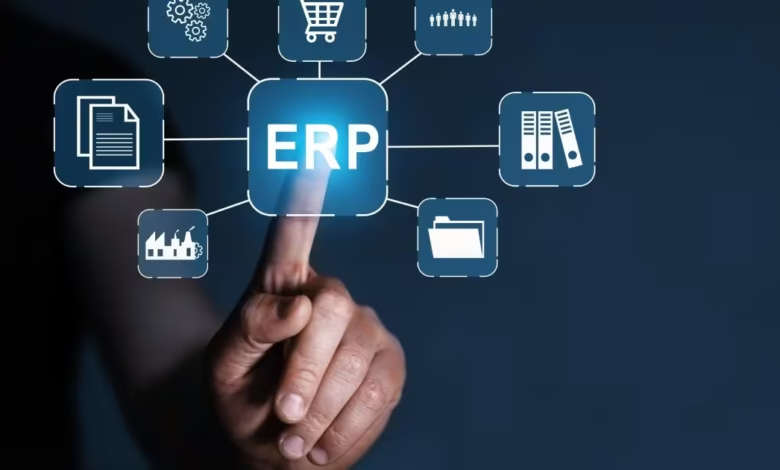How Microsoft ERP Empowers Small Businesses to Compete with Enterprises

In today’s digital-first economy, the competitive line between small businesses and large enterprises is thinner than ever. Customers expect seamless experiences, fast responses, and personalized service—regardless of your business size.
The challenge for small businesses? Matching the capabilities of enterprise organizations without the same resources or budget.
That’s where Microsoft ERP comes in.
Microsoft’s cloud-based enterprise resource planning (ERP) solutions are helping small and midsize businesses (SMBs) level the playing field. From automating back-office tasks to delivering real-time business insights, Microsoft ERP equips growing companies with the same digital agility and intelligence that power global corporations.
Here’s how Microsoft ERP empowers small businesses to thrive—and compete.
What Is Microsoft ERP?
Microsoft ERP refers to a suite of integrated business management tools that help organizations streamline finance, operations, supply chain, and more. While many associate ERP systems with large enterprises, Microsoft has developed solutions tailored specifically for SMBs—most notably Dynamics 365 Business Central. So, in case you’re thinking of migrating, you should migrate and modernize your ERP with Dynamics 365.
Business Central brings together essential business functions like:
- Financial management
- Sales and customer relationship management
- Supply chain and inventory
- Project management
- Reporting and analytics
A single, secure, and scalable cloud-based platform.
It’s designed to be simple enough for small teams to adopt quickly, yet powerful enough to support business growth and complexity over time.
Key Benefits of Using Microsoft ERP for Your Business
Enterprise-Grade Capabilities, SMB-Friendly Design
Small businesses don’t lack ambition—they often lack access to the tools that streamline operations and improve decision-making. Microsoft ERP bridges that gap by delivering enterprise-grade functionality without the complexity or cost of legacy systems.
Here’s how:
- Cloud-based deployment removes the need for costly hardware or IT teams.
- Intuitive interfaces allow users to navigate and learn quickly.
- Flexible licensing and modular features help you pay only for what you need.
- Automated updates and security keep systems current with minimal effort.
The result? Small businesses gain access to the same kind of automation, data visibility, and integration that big companies rely on—without the overhead.
Streamlining Operations to Improve Efficiency
One of the biggest struggles for SMBs is juggling disconnected tools—spreadsheets for finance, manual processes for orders, and separate systems for inventory. This leads to inefficiencies, delays, and costly errors.
Microsoft ERP addresses this by centralizing all business data and processes on a single platform.
For example:
- Sales orders automatically update inventory levels and financial ledgers.
- Purchase orders trigger vendor workflows and delivery schedules.
- Time tracking and expenses flow directly into project accounting.
Everything is connected. This streamlines operations, reduces manual work, and frees up time for teams to focus on growth and customer experience.
Real-Time Insights for Smarter Decisions
In fast-paced markets, waiting for month-end reports or pulling data from multiple spreadsheets can slow your response time—and lead to missed opportunities.
Microsoft ERP gives small business owners and managers access to real-time dashboards, KPIs, and reports. With built-in analytics powered by Power BI, you can:
- Track cash flow and profitability
- Monitor inventory turnover
- Forecast demand and supply chain risks
- Analyze sales performance across regions or channels
This kind of insight empowers SMBs to make proactive, data-driven decisions just like enterprise organizations do—without hiring a team of analysts.
Built-In Automation to Reduce Overhead
Automation isn’t just for big companies anymore. Microsoft ERP solutions come with built-in automation features that reduce repetitive tasks and minimize human error.
You can automate:
- Recurring invoices and payments
- Approval workflows for expenses or purchases
- Email reminders for unpaid invoices
- Inventory reordering thresholds
These time-saving automations improve consistency and free up staff to focus on high-value tasks—like customer service, product development, or sales.
Agility to Scale with Your Business
Growth is the goal for most small businesses—but growth also brings operational complexity. The beauty of Microsoft ERP is that it scales with you.
As your business adds new products, regions, warehouses, or employees, Microsoft ERP adapts:
- Add new users with simple licensing adjustments
- Expand to multiple locations or legal entities
- Integrate with new tools or marketplaces (Shopify, Amazon, etc.)
- Leverage APIs or low-code apps via Microsoft Power Platform
You don’t have to rip and replace your ERP system as you grow. Microsoft ERP evolves with your business, giving you room to scale without disruption.
Seamless Integration with the Microsoft Ecosystem
One of the strongest advantages for small businesses already using Microsoft 365 (Outlook, Excel, Teams, etc.) is how naturally Microsoft ERP integrates into your existing workflows.
For example:
- Create and edit financial reports in Excel with live ERP data
- Use Teams to collaborate on sales opportunities linked to customer records
- Schedule and track meetings directly from Dynamics 365
- Build no-code apps in Power Apps connected to your ERP data
This tight integration boosts productivity, reduces duplication, and lowers the learning curve—because your team is already familiar with the tools.
Enterprise-Level Security and Compliance
Even small businesses are targets for cyber threats. Microsoft ERP, built on Azure, provides advanced security capabilities including:
- Role-based access and multi-factor authentication
- Data encryption at rest and in transit
- Regular backups and disaster recovery
- Compliance with global standards like GDPR and ISO
These features help SMBs protect customer data, maintain trust, and meet regulatory requirements—without hiring a full IT security team.
Customer Success: Small Businesses Making Big Moves with Microsoft ERP
Small businesses around the world are already using Microsoft Dynamics 365 ERP to compete—and win—against larger competitors. A few real-world outcomes include:
- A distribution company reduced inventory holding costs by 30%
- A consulting firm automated 90% of invoicing, reducing errors
- A manufacturer expanded to 3 new regions using the same ERP platform
- A services business improved cash flow by gaining real-time visibility into receivables
These aren’t just tech wins—they’re business wins made possible through smarter operations and better insights.
Final Thoughts: A Big-League Platform for Growing Businesses
In 2025, competing with enterprise companies doesn’t require enterprise-level budgets. With Microsoft ERP, small businesses can harness the same tools, intelligence, and agility that the world’s largest organizations use—tailored to their size and growth stage.
Whether you’re managing orders, forecasting revenue, or scaling into new markets, Microsoft ERP gives you the control, clarity, and confidence to operate like a big business—without losing your entrepreneurial edge.
If you’re ready to move beyond spreadsheets and disconnected systems, Microsoft ERP is your launchpad for long-term success in a competitive marketplace.



